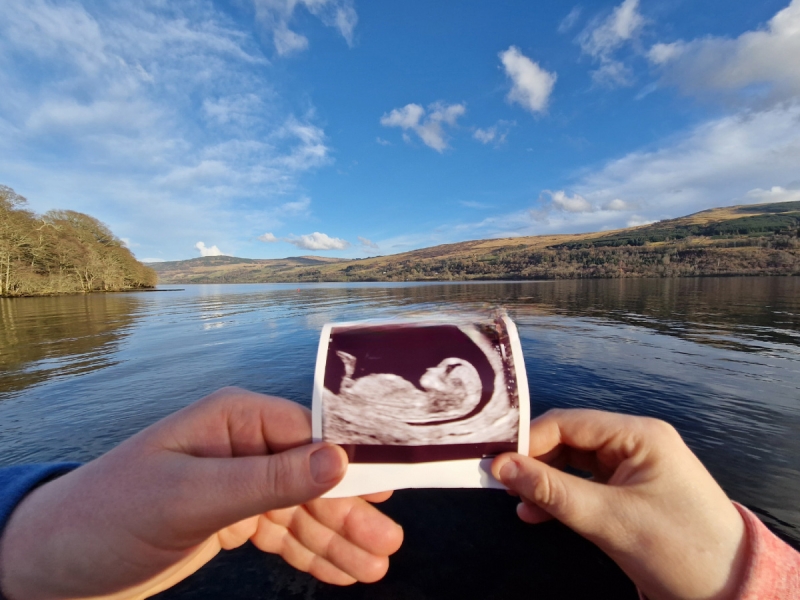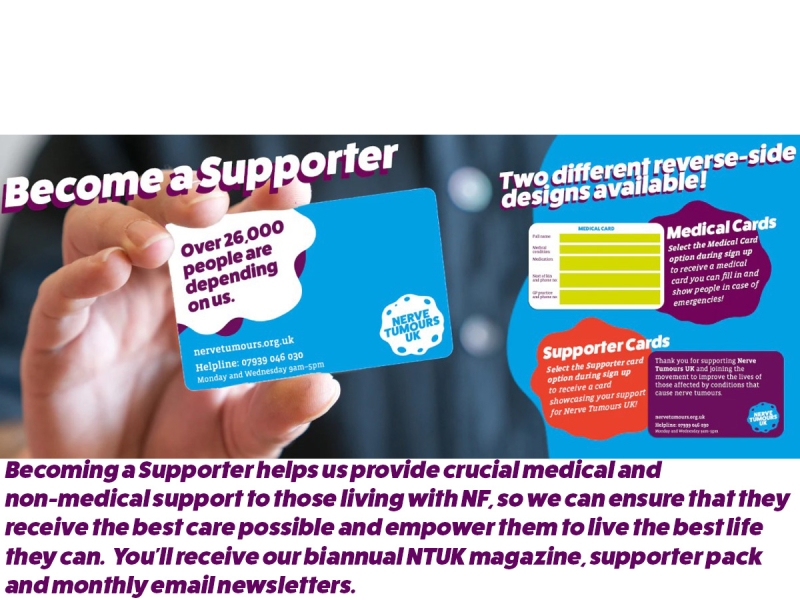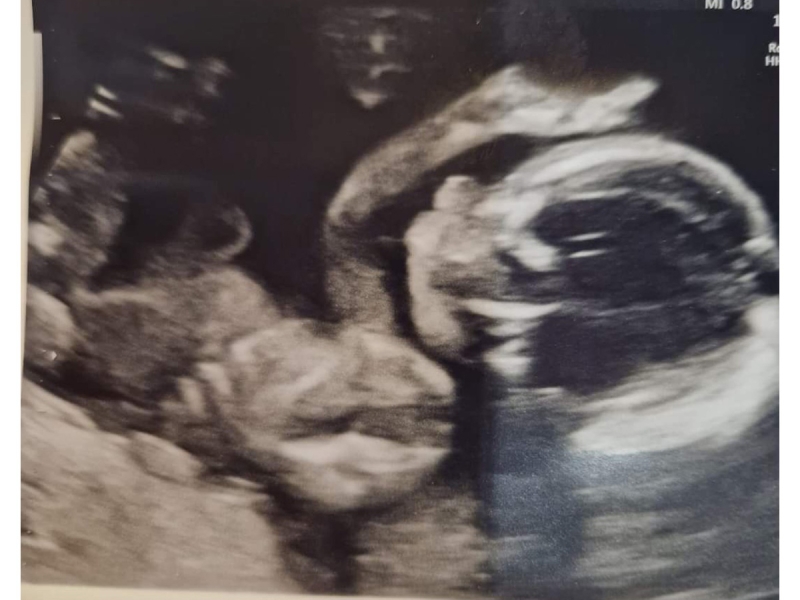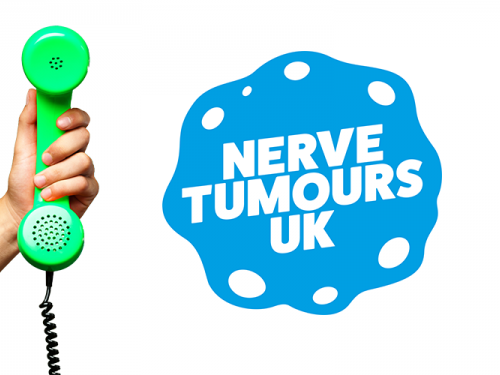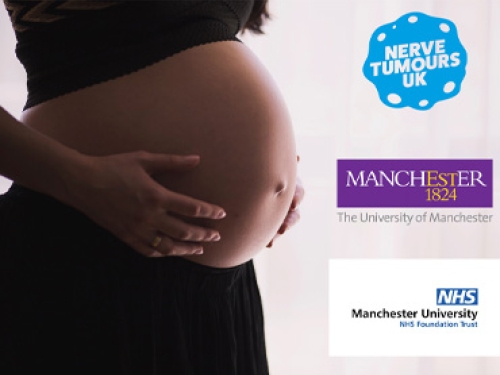Nicole’s story
22 January 2024
I’m Nicole, I’m 31 with Neurofibromatosis Type 2.
Life for all of us with nerve tumours certainly has its challenges, I never thought I’d be able to have a family, then I had all the anxieties of starting a family with a condition that can be passed on but I want to share the overwhelmingly positive, life changing experience of the birth of my son.
Share YOUR story for Rare Disease Day
Rare Disease Day creates visibility and community. Nerve Tumours UK raises awareness by focusing on the stories and fundraisers that highlight the impact of NF every day. Follow in Nicole's footsteps and share YOUR story by emailing info@nervetumours.org.uk. We will publish your story following Rare Disease Day 29.2.2024. Help us make #MakeNFVisible.
Since I wrote about pregnancy in an article in the last Nerve Tumours UK magazine, our family of two became three, with the arrival of Lewis in October. Pregnancy was as they describe, first trimester sick as a dog, 2nd trimester exciting expectations whilst feeling on top of the world and yes, by the 3rd trimester I was marking time, counting down the days whilst struggling to fit myself anywhere!
Thankfully the NF2 didn’t present too many issues during the pregnancy. I had a non-contrast MRI mid pregnancy to monitor a meningioma which can grow more rapidly in the hormone rich pregnancy state but thankfully all was well. As I turned my attention to making a birth plan we requested a review by an obstetric anaesthetist to see what our options were for pain relief in labour. Having had schwannomas removed from my thoracic spine, any form of regional spinal blocks such as epidurals was deemed out so if I needed anything more exciting than diamorphine or gas and air, it was to be a general anaesthetic. This took a bit to get my head around but speaking to two other mothers who had delivered their children, not by choice via GA, was really helpful.
My husband kept saying as long as mother and baby are delivered home safely at the end of the day, it’s not worth worrying. My antenatal clinics were really memorable for me as for the first time in my life I was going for scans, consultants and assessments and they were saying “yup all normal”, “progressing as planned”. I’m used to hospital appointments being challenging, bad news and need for medical intervention, what excitement it brought to have positive appointments.
I work as an outpatient clinic staff nurse and kept working up to 36 weeks. In retrospect it was maybe a little optimistic. Just getting out of bed can be a challenge at that stage, far less trying to drive a car and do a day’s work. My colleagues were fantastic, they looked out for me at every stage and went out of their way to make life that bit easier, from reaching things down low to taking on some of my workload when I was knackered. They gave me a lovely big hamper of gifts from baby clothes, nappies, blankets, toys, even our own Mum, Dad and baby cups.
It was very exciting preparing for birth. Our spare room was redecorated and turned into a nursery. We painted the walls with a hardwearing and “apparently” child resistant paint in expectation of future crayons, pens and goodness knows what else! We applied decals on the wall of lighthouse, boats, fish and the seaside. A cot, changing station, pram provided marital bliss in their joint assembly from flat pack. Thankfully we familiarised ourselves with the idiosyncrasies of the car seat and pram in advance of our sons birth - avoiding the fear stories of trying to work it out from the drive home from hospital with a new addition.
Antenatal classes made everything very real, one was delivered by a quietly spoken midwife who frequently covered her face when speaking so I have no clue what was shared, however, another who knew I was deaf went out of her way to accommodate me so I could lip-read.
In the last weeks, my husband and I took some time off and went on adventures as our last hurrah before we became three - we visited museums, botanical gardens, went glamping, indeed family and friends raised eyebrows about one particular overnight trip to the Highlands, some three hours from a maternity hospital, so close to our due date but it was a special time for us and we loved it.
Towards our due date, my blood pressure started going up (pre-eclampsia) and after some to and fro, a decision was made for an unplanned GA caesarean section. It wasn’t the hands off water birth we had planned for. We kept it secret from all the family (which even meant engineering an excuse as to why my parents had to look after our dog on the morning of the c-section). I’ve had over 11 operations in my life so wanted this not to be something people worried and festered on. We had setup an inflatable hot tub under a gazebo in the garden so we could start the water birth before heading to hospital. Given the change in circumstances on the evening before Lewis’s birth, we enjoyed relaxing under the stars in a lovely clear night under a full moon. It was very special.
The next day our family became three with the birth of Lewis at 0957. We had agreed in advance we both wanted to meet him together so the midwives looked after Lewis whilst they finished the operation, then we were wheeled round together. Apparently I awoke interrogating my husband if he had broken the promise and seen Lewis. The anaesthetist had to step in and assure me that he had witnessed my husband and he hadn’t left my side to go and see Lewis in his cot. We had a really special two hours together before we told any family and friends that he had been born. It was magical.
Being a mum is such a fantastic thing and I am loving every moment of it. Life is very different but for the better. The biggest challenge of parenthood is my lack of hearing. I went to breastfeeding support group to meet other mothers, it was impossible to focus on one conversation when lots of people around a circle are having conversations and babies are crying. Same with baby classes, then there is the joys of very limited hearing with the aqua kit on my cochlear implant for swimming classes. Before I had my son, I could just take my cochlear implant out and not hear anything at night. I have a cochlear implant on my left aide and no hearing on right side. Since having Lewis, I need to keep my cochlear implant in all night to hear him during the night.
The first night home from hospital, I could hardly sleep for some strange noise that took me a while to work out (bearing in mind I've had the luxury of silent nights) eventually after an hour I discovered the noise was in fact my husband snoring! I've had 6 years of not having to listen to it, and now need to suffer every night. The snoring keeps me up more than Lewis! Two months after Lewis was born my hearing felt so much better and I wondered if it was because I was wearing my implant all day and night. Well I got my answer at the next hearing test, where to my surprise I have went from 5% speech recognition to 87% speech recognition. I’m over the moon and such a lovely way to start the year.
It’s been a fantastic learning curve since birth, I’m so proud to have bought our little boy into the world, sustain his every need and nurture him. The plus side of breastfeeding is I’ve dropped 3 dress sizes and the health visitor reported I can eat whatever I want, whenever I want! Despite being a winter baby, I’ve managed to have him out in his pram most days from a day after he came home from hospital – it’s so energising walking amongst nature. I’ve taken nine months off work to bring up Lewis, however, I took him into work to show my colleagues at three weeks old and they reported that my maternity uniform ordered in the first trimester had just arrived!
I never thought I would see myself married and having children due to NF2, but life certainly proves you wrong and you can achieve anything you put your mind to.
Nicole's story about living with NF2 and starting a family originally featured in our magazine. If you would like to receive our biannual magazine, click on the link below to become a supporter.
Nicole's story as featured in the Nerve Tumours UK magazine issue 11
I was diagnosed with NF2 in 2009 at the age of 16 years old. Unfortunately, my right sided Vestibular Schwannoma was very large, pushing on the brain stem and causing hearing loss and slight facial palsy.
I underwent 12.5 hours of brain surgery whilst still at school to remove this. I had to miss my high school exams and return the following year to catch up. After surgery, I lost all remaining hearing in my right ear and was left with complete facial palsy which has improved over the years, however I do still have several issues with my right eye.
Over the years, I have had several surgeries to remove tumours from my spine and limbs, several eye surgeries and surgeries for nosebleeds. In 2021, I went through a tough 6 months of Avastin therapy to try and reduce the size of some spinal tumours in the lower spine as they were causing me a great deal of pain. Unfortunately, I experienced a lot of unwanted side effects from Avastin. Suddenly, over the course of 3 weeks during treatment, I started getting lots of tingling down both legs, increased pain and numbness and loss of control with my bladder. One of the tumours was hitting the spinal cord. I was quickly admitted to hospital and underwent surgery a few days later, after an MRI scan and steroid treatment.
I still live with several spinal tumours and brain tumours. Although my left vestibular schwannoma remains stable at 7mm, it caused a big decrease in my hearing with only 5% hearing remaining. In November 2022, I underwent left cochlear implant surgery, with a switch on 1 month later.
I am now 6 months post switch on and picking up more sounds every day Everything still sounds very robotic and I get bad headaches, but I understand it takes time for the body to adjust. Living with NF2 is very difficult physically and emotionally – living with constant pain, hearing loss, along with many other symptoms.
However it has made me a stronger person and after my first brain surgery at 16, I decided I would become a nurse to help others. I am now 8 years qualified. I met my husband through work and have been married just over a year and expecting a baby in early October. I am currently 26 weeks pregnant. Having NF2 has its challenges when it comes to being pregnant. Firstly, I contacted the genetics department in Glasgow and within 2 weeks was seen by a consultant within the department, I then contacted my local antenatal team to set up further appointments and be booked onto the system.
My first appointment with the genetics department I was very nervous, despite attending hundreds of appointments before for various things, this one was different for us. At the appointment the consultant explained Chorionic Villus Sampling (CVS Testing), when this test would be carried out, how I would get the results and how I want to proceed after I receive the results.
My husband and I knew we would have a challenging few weeks ahead of us. The following week, I then attended my local maternity unit where an ultrasound was carried out and worked out a date for the CVS testing. Going for our first ultrasound, my husband and I were very nervous. After the ultrasound, the midwife contacted genetics with all the relevant information. Five weeks passed and I was seen at the Foetal Medicine Unit in Glasgow, after a quick ultrasound I was told I was 11 weeks and 2 days pregnant. I was extremely nervous that day but the team was fantastic and supported me every step of the way.
The team then explained the procedure and got me to sign a consent form to say I was happy to go ahead. There was a small risk of infection and miscarriage. I then lay on the bed holding my husband's hand as I was terrified by this point, unsure what I was going to experience. A small injection of local anaesthetic was put in my stomach. Once this worked, a large needle then went through the stomach and cells were then taken from the placenta. This was slightly uncomfortable and painful. The other doctor then took a small sample and placed it under the microscope to ensure enough cells were collected and could be sent away to the lab for testing. I then had to wait in a room for 30 minutes, to ensure I was ok and did not have any effects. For 2 days afterwards, I had bad cramping and was advised to take a few days off work to let things settle.
My husband and I were told that within 3 days, we would get the initial results for Downs Syndrome, Edwards Syndrome and Pataus’ Syndrome and if we wanted, we could find out the gender of the baby. I knew I wanted to find out the gender, as I like to be very organised and have everything sorted.
We found out that the initial results came back clear and that we were having a boy. The next few weeks seemed to go by really slowly and was mentally draining for both of us. Eventually after 10 days, we got the phone call from the consultant to say that the baby was not affected by NF2. Due to me being mosaic, I have about a 5-10% chance of passing on NF2.
I am glad I can now relax and enjoy the pregnancy. NF2 unfortunately still gets in the way and I need a meningioma removed from my brain after pregnancy. I was already 7 weeks pregnant when I found out this tumour had grown quite a bit. This was a shock for everyone as the tumour has been stable for so many years. However, it is something I am trying not to focus on at the moment and just concentrate on having a normal healthy pregnancy.
I must admit I have been through a lot of mentally challenging situations in my life, but waiting on CVS results was one of the hardest things I’ve had to go through.

_1200x200_with_RDD_logo_800_600_s_c1.jpg)
